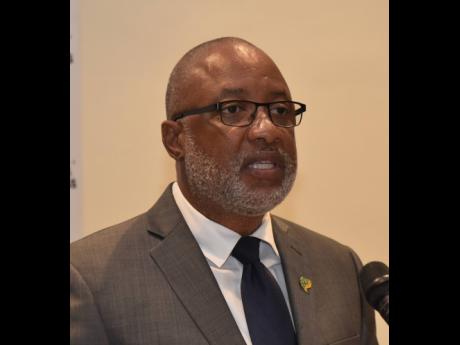Editorial | A whingeing permanent secretary
Dunstan Bryan, the permanent secretary in the Ministry of Health and Wellness, still appears not to have grasped it.
As the ministry’s top civil servant, he is the accountable officer for its performance, including its finances. That doesn’t depend on what happens in other ministries, agencies and departments (MDAs).
Put bluntly, Mr Bryan, like other permanent secretaries, is obliged to account for taxpayers’ resources. Hubris, blame shifting, or contortions, which have become Mr Bryan’s staple in his appearances before Parliament’s Public Accounts Committee (PAC), won’t cut it.
The current issue relating to the health ministry’s stewardship of taxpayers’ money has to do with its failure, for nearly a decade, to submit to the Auditor General appropriations accounts for the expenditure of nearly J$700 billion, which the AuG, Pamela Monroe Ellis, flagged in her 2021/22 report, released in 2023.
Some of the outstanding accounts predate Mr Bryan’s tenure. And his ministry, as the auditor general report revealed, wasn’t the only one behind with its accounts – a fact that Mr Bryan latched on to at a PAC hearing last week with a contortionist’s skill, in search of exculpation.
Clearly, there are operational weaknesses across Jamaica’s public sector, some of which are systemic, requiring holistic, system-wide solutions. That, however, doesn’t relieve the managers of individual MDAs from their responsibility and obligation to abide by basic accountability rules and to fix problems that fall within their purview.
OFFENSIVE TO TAXPAYERS
Indeed, it helps no one, and is offensive to taxpayers, whose hard-earned money is on the line, when public officials respond with contemptuous haughtiness to questions about failure to abide by accountability rules. Which, unfortunately now, defines Mr Bryan approach to accountability questions, since his appearance before the PAC last year for a hearing on how the health ministry spent J$619 million on COVID-19 activities over a five-month period in 2021.
The auditor general had, among other things, raised concerns over the ministry’s use of government purchase orders as proxies for procurement contracts.
Hitting back at Ms Monroe Ellis’ assertion that this breached the government’s procurement regulations, Mr Bryan described her report to be “subpar” and declared that the auditor general’s “opinions or ruminations do not bind me”.
He added: “As a matter of fact, until the auditor general can provide in law what rule the compliance audit’s finding was predicated on, I have no obligation. None!”
The urgency demanded the pandemic may have cut the health authorities some slack, but not to the point of totally upending the rules, thus widening the possibilities for abuse. And then to be arrogant about it!
Separately, the auditor general’s annual report disclosed the failure of the health ministry to file its appropriation accounts (which show how allocated money has been spent) for nine financial years, between 2013/14 and 2021/22. Initially, the auditor general put the value of the delinquent accounts at J$560 billion, but subsequently updated the amount to J$695 billion.
A year later, Ms Monroe Ellis confirmed that her office hadn’t received the outstanding accounts, which the health ministry blamed on weaknesses in the government’s accounting software, a shortage, and a turnover of employees. New staff, Mr Bryan said, were unwilling to, or wary of certifying expenditures that predated their tenure.
CIRCLED THE WAGON
When questions were publicly raised about the outstanding reports, the informal union of permanent secretaries circled the wagon around Mr Bryan.
It emerged at last week’s PAC hearing that the ministry had given itself until March 2025, that is, the end of the current fiscal year, to complete the accounts and deliver them to the finance ministry and the auditor general. It is incredulous that the PAC was only dealing with the issue a full-year after it emerged.
In arguing that the problems – such as unsigned payment vouchers – which contributed to the failure to certify appropriations accounts, were not unique to the health ministry, Mr Bryan noted that there were 391 outstanding financial statements across MDA, going back to 2009. There were also 184 delayed appropriations accounts, of which 39 belonged to his ministry.
“And I am saying, until you have done the root-cause analysis on all of the 184, you cannot definitively say that the issues that we have identified in the Ministry of Health are not existing in other ministries,” Mr Bryan pushed back at a finance ministry official who reported that he had not seen the same level of failure in other ministries.
We make two observations.
First, the health ministry, using Mr Bryan’s sums, was responsible for fully a fifth (21.19 per cent) of all outstanding appropriations accounts. That, by any measure, is a high proportion.
More importantly, the fact that bureaucrats in other ministries failed to sign payment vouchers or properly log expenditures doesn’t exonerate those in the health ministry. Further, each permanent secretary, as are managers in other enterprises, is obligated, firstly, to his or her operation, ensuring that it is run properly. Managers must hold their staff accountable, and must fix problems as they arise.
Whingeing after the fact won’t do.
Mr Bryan goes off on study leave in September. Hopefully, he has established systems to ensure that the health ministry meets next March deadline for delivery of the outstanding accounts.

